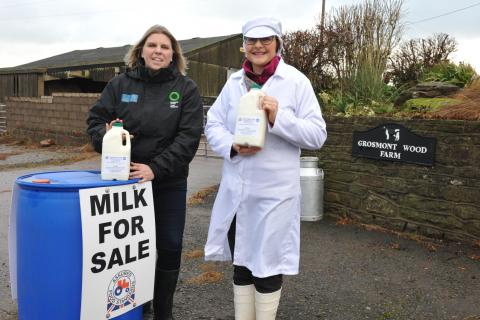A family-run dairy farming business is taking control of its milk price by selling direct to the public.
Robert and Emma Robinson relocated their dairy herd to Wales from Bedfordshire in 2014 and were heavily invested in their new enterprise when the milk price crashed.
“We were initially paid 32 pence a litre but the price started to fall and at its lowest we received 11 pence for some of our milk,’’ Emma recalls.
With a background in sales, Emma investigated the possibility of selling raw milk direct from the farm at Grosmont, near Abergavenny, but then spotted an opportunity to brush up on the marketing skills that would underpin the new venture.
“We registered with Farming Connect when we came to Wales and quickly realised that a whole raft of support services were available to us.”
A subsidised marketing course, provided by approved Farming Connect training consultancy, Simply the Best, inspired Emma with new ideas on how to brand and market raw milk.
Robert recalls her returning from the course, “buzzing with ideas!’’
The Robinsons had already completed all the Food Standard Agency protocols necessary for retailing unpasteurised milk and were soon selling milk direct from the farm and from Farmers’ Markets. Within two months of completing the course, they were charging £1.50 for a two-litre carton sold at the farmgate and £2 at Farmers’ Markets and had launched online sales
Online orders are despatched by courier twice a week. Their best seller is eight cartons for £28 which includes packaging and delivery charges. “The milk keeps fresh in the fridge for three days so our customers pop one into the fridge and freeze the others,’’ says Emma.
Daily sales range from 15 litres to 40 litres with the rest of their milk sold to First Milk but the market for their raw milk is growing.
“If we average £10 a day that’s £3,500 a year and that is not to be sniffed at when we are being paid less than 20 pence a litre for the milk in our bulk tank,’’ says Robert.
“Our customers tell us they would be happy to pay more but we need to stay competitive with the supermarkets. We feel this is as far as we can push the price for now.’’
The milk is produced by the pedigree Felmersham herd of 80 Holstein cows at 380-acre Grosmont Wood Farm.
It is an all-year-round calving system and milk is produced from grass from April to November before cows are housed for the winter. The Robinsons also lamb 250 North Country mules in April and grow wheat, oats, peas and maize to feed to their stock. The straw generated by the crops provides a valuable resource on the farm.
Potential diversification opportunities were on Robert and Emma’s list of must-haves when they were viewing farms. “We always asked ourselves: “What else could we do here apart from produce milk?” says Emma.
Grosmont Wood Farm had good equine facilities already in place, so the couple saw potential for another income stream.
Emma attended a Farming Connect diversification event on a nearby farm which encouraged her to investigate the feasibility of establishing a retirement home for horses.
She applied for 80% funding from Farming Connect for business and financial advice which gave her the confidence to set up the new venture and launch a website.
Within a week of launching the website, the first horse arrived and was quickly followed by another two. “It gives us an important weekly income,’’ says Robert.
The website was already in place when they were setting up the online milk sales business so they only needed to add an additional function to get the internet shop up and running.
Robert and Emma say that with a strong support structure for farming and rural enterprises, there is real benefit to farming in Wales. Robert and their son, Harvey, had also attended a Farming Connect foot trimming course, again 80% subsidised.
“In Wales people try to help you. A support structure like Farming Connect doesn’t exist in England,’’ says Emma.
“Farmers shouldn’t be shy to ask for help, there is a huge suite of support services on offer and we need to grasp these because we are going to need to become ever more creative in what we do when we exit the European Union.’’
Robert and Emma say the support they have received through Farming Connect has helped them with the progression of their business through a challenging time for the industry.
“Welsh farmers are in a stronger position because of Farming Connect,’’ says Emma.

